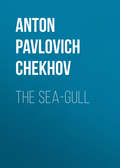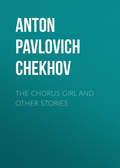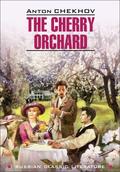
Антон Чехов
The Schoolmistress, and Other Stories
While they are having tea, when it is quite dark and a lantern is hanging on the wall again as on the previous evening, the train quivers from a slight shock and begins moving backwards. After going a little way it stops; they hear indistinct shouts, someone sets the chains clanking near the buffers and shouts, “Ready!” The train moves and goes forward. Ten minutes later it is dragged back again.
Getting out of the van, Malahin does not recognize his train. His eight vans of bullocks are standing in the same row with some trolleys which were not a part of the train before. Two or three of these are loaded with rubble and the others are empty. The guards running to and fro on the platform are strangers. They give unwilling and indistinct answers to his questions. They have no thoughts to spare for Malahin; they are in a hurry to get the train together so as to finish as soon as possible and be back in the warmth.
“What number is this?” asks Malahin
“Number eighteen.”
“And where is the troop train? Why have you taken me off the troop train?”
Getting no answer, the old man goes to the station. He looks first for the familiar figure of the head guard and, not finding him, goes to the station-master. The station-master is sitting at a table in his own room, turning over a bundle of forms. He is busy, and affects not to see the newcomer. His appearance is impressive: a cropped black head, prominent ears, a long hooked nose, a swarthy face; he has a forbidding and, as it were, offended expression. Malahin begins making his complaint at great length.
“What?” queries the station-master. “How is this?” He leans against the back of his chair and goes on, growing indignant: “What is it? and why shouldn’t you go by number eighteen? Speak more clearly, I don’t understand! How is it? Do you want me to be everywhere at once?”
He showers questions on him, and for no apparent reason grows sterner and sterner. Malahin is already feeling in his pocket for his pocketbook, but in the end the station-master, aggrieved and indignant, for some unknown reason jumps up from his seat and runs out of the room. Malahin shrugs his shoulders, and goes out to look for someone else to speak to.
From boredom or from a desire to put the finishing stroke to a busy day, or simply that a window with the inscription “Telegraph!” on it catches his eye, he goes to the window and expresses a desire to send off a telegram. Taking up a pen, he thinks for a moment, and writes on a blue form: “Urgent. Traffic Manager. Eight vans of live stock. Delayed at every station. Kindly send an express number. Reply paid. Malahin.”
Having sent off the telegram, he goes back to the station-master’s room. There he finds, sitting on a sofa covered with gray cloth, a benevolent-looking gentleman in spectacles and a cap of raccoon fur; he is wearing a peculiar overcoat very much like a lady’s, edged with fur, with frogs and slashed sleeves. Another gentleman, dried-up and sinewy, wearing the uniform of a railway inspector, stands facing him.
“Just think of it,” says the inspector, addressing the gentleman in the queer overcoat. “I’ll tell you an incident that really is A1! The Z. railway line in the coolest possible way stole three hundred trucks from the N. line. It’s a fact, sir! I swear it! They carried them off, repainted them, put their letters on them, and that’s all about it. The N. line sends its agents everywhere, they hunt and hunt. And then – can you imagine it? – the Company happen to come upon a broken-down carriage of the Z. line. They repair it at their depot, and all at once, bless my soul! see their own mark on the wheels What do you say to that? Eh? If I did it they would send me to Siberia, but the railway companies simply snap their fingers at it!”
It is pleasant to Malahin to talk to educated, cultured people. He strokes his beard and joins in the conversation with dignity.
“Take this case, gentlemen, for instance,” he says. “I am transporting cattle to X. Eight vanloads. Very good… Now let us say they charge me for each vanload as a weight of ten tons; eight bullocks don’t weigh ten tons, but much less, yet they don’t take any notice of that…”
At that instant Yasha walks into the room looking for his father. He listens and is about to sit down on a chair, but probably thinking of his weight goes and sits on the window-sill.
“They don’t take any notice of that,” Malahin goes on, “and charge me and my son the third-class fare, too, forty-two roubles, for going in the van with the bullocks. This is my son Yakov. I have two more at home, but they have gone in for study. Well and apart from that it is my opinion that the railways have ruined the cattle trade. In old days when they drove them in herds it was better.”
The old man’s talk is lengthy and drawn out. After every sentence he looks at Yasha as though he would say: “See how I am talking to clever people.”
“Upon my word!” the inspector interrupts him. “No one is indignant, no one criticizes. And why? It is very simple. An abomination strikes the eye and arouses indignation only when it is exceptional, when the established order is broken by it. Here, where, saving your presence, it constitutes the long-established program and forms and enters into the basis of the order itself, where every sleeper on the line bears the trace of it and stinks of it, one too easily grows accustomed to it! Yes, sir!”
The second bell rings, the gentlemen in the queer overcoat gets up. The inspector takes him by the arm and, still talking with heat, goes off with him to the platform. After the third bell the station-master runs into his room, and sits down at his table.
“Listen, with what number am I to go?” asks Malahin.
The station-master looks at a form and says indignantly:
“Are you Malahin, eight vanloads? You must pay a rouble a van and six roubles and twenty kopecks for stamps. You have no stamps. Total, fourteen roubles, twenty kopecks.”
Receiving the money, he writes something down, dries it with sand, and, hurriedly snatching up a bundle of forms, goes quickly out of the room.
At ten o’clock in the evening Malahin gets an answer from the traffic manager: “Give precedence.”
Reading the telegram through, the old man winks significantly and, very well pleased with himself, puts it in his pocket.
“Here,” he says to Yasha, “look and learn.”
At midnight his train goes on. The night is dark and cold like the previous one; the waits at the stations are long. Yasha sits on the cape and imperturbably strums on the accordion, while the old man is still more eager to exert himself. At one of the stations he is overtaken by a desire to lodge a complaint. At his request a gendarme sits down and writes:
“November 10, 188-. – I, non-commissioned officer of the Z. section of the N. police department of railways, Ilya Tchered, in accordance with article II of the statute of May 19, 1871, have drawn up this protocol at the station of X. as herewith follows… ”
“What am I to write next?” asks the gendarme.
Malahin lays out before him forms, postal and telegraph receipts, accounts… He does not know himself definitely what he wants of the gendarme; he wants to describe in the protocol not any separate episode but his whole journey, with all his losses and conversations with station-masters – to describe it lengthily and vindictively.
“At the station of Z.,” he says, “write that the station-master unlinked my vans from the troop train because he did not like my countenance.”
And he wants the gendarme to be sure to mention his countenance. The latter listens wearily, and goes on writing without hearing him to the end. He ends his protocol thus:
“The above deposition I, non-commissioned officer Tchered, have written down in this protocol with a view to present it to the head of the Z. section, and have handed a copy thereof to Gavril Malahin.”
The old man takes the copy, adds it to the papers with which his side pocket is stuffed, and, much pleased, goes back to his van.
In the morning Malahin wakes up again in a bad humor, but his wrath vents itself not on Yasha but the cattle.
“The cattle are done for!” he grumbles. “They are done for! They are at the last gasp! God be my judge! they will all die. Tfoo!”
The bullocks, who have had nothing to drink for many days, tortured by thirst, are licking the hoar frost on the walls, and when Malachin goes up to them they begin licking his cold fur jacket. From their clear, tearful eyes it can be seen that they are exhausted by thirst and the jolting of the train, that they are hungry and miserable.
“It’s a nice job taking you by rail, you wretched brutes!” mutters Malahin. “I could wish you were dead to get it over! It makes me sick to look at you!”
At midday the train stops at a big station where, according to the regulations, there was drinking water provided for cattle.
Water is given to the cattle, but the bullocks will not drink it: the water is too cold…
Two more days and nights pass, and at last in the distance in the murky fog the city comes into sight. The journey is over. The train comes to a standstill before reaching the town, near a goods’ station. The bullocks, released from the van, stagger and stumble as though they were walking on slippery ice.
Having got through the unloading and veterinary inspection, Malahin and Yasha take up their quarters in a dirty, cheap hotel in the outskirts of the town, in the square in which the cattle-market is held. Their lodgings are filthy and their food is disgusting, unlike what they ever have at home; they sleep to the harsh strains of a wretched steam hurdy-gurdy which plays day and night in the restaurant under their lodging.
The old man spends his time from morning till night going about looking for purchasers, and Yasha sits for days in the hotel room, or goes out into the street to look at the town. He sees the filthy square heaped up with dung, the signboards of restaurants, the turreted walls of a monastery in the fog. Sometimes he runs across the street and looks into the grocer’s shop, admires the jars of cakes of different colors, yawns, and lazily saunters back to his room. The city does not interest him.
At last the bullocks are sold to a dealer. Malahin hires drovers. The cattle are divided into herds, ten in each, and driven to the other end of the town. The bullocks, exhausted, go with drooping heads through the noisy streets, and look indifferently at what they see for the first and last time in their lives. The tattered drovers walk after them, their heads drooping too. They are bored… Now and then some drover starts out of his brooding, remembers that there are cattle in front of him intrusted to his charge, and to show that he is doing his duty brings a stick down full swing on a bullock’s back. The bullock staggers with the pain, runs forward a dozen paces, and looks about him as though he were ashamed at being beaten before people.
After selling the bullocks and buying for his family presents such as they could perfectly well have bought at home, Malahin and Yasha get ready for their journey back. Three hours before the train goes the old man, who has already had a drop too much with the purchaser and so is fussy, goes down with Yasha to the restaurant and sits down to drink tea. Like all provincials, he cannot eat and drink alone: he must have company as fussy and as fond of sedate conversation as himself.
“Call the host!” he says to the waiter; “tell him I should like to entertain him.”
The hotel-keeper, a well-fed man, absolutely indifferent to his lodgers, comes and sits down to the table.
“Well, we have sold our stock,” Malahin says, laughing. “I have swapped my goat for a hawk. Why, when we set off the price of meat was three roubles ninety kopecks, but when we arrived it had dropped to three roubles twenty-five. They tell us we are too late, we should have been here three days earlier, for now there is not the same demand for meat, St. Philip’s fast has come… Eh? It’s a nice how-do-you-do! It meant a loss of fourteen roubles on each bullock. Yes. But only think what it costs to bring the stock! Fifteen roubles carriage, and you must put down six roubles for each bullock, tips, bribes, drinks, and one thing and another…”
The hotel-keeper listens out of politeness and reluctantly drinks tea. Malahin sighs and groans, gesticulates, jests about his ill-luck, but everything shows that the loss he has sustained does not trouble him much. He doesn’t mind whether he has lost or gained as long as he has listeners, has something to make a fuss about, and is not late for his train.
An hour later Malahin and Yasha, laden with bags and boxes, go downstairs from the hotel room to the front door to get into a sledge and drive to the station. They are seen off by the hotel-keeper, the waiter, and various women. The old man is touched. He thrusts ten-kopeck pieces in all directions, and says in a sing-song voice:
“Good by, good health to you! God grant that all may be well with you. Please God if we are alive and well we shall come again in Lent. Good-by. Thank you. God bless you!”
Getting into the sledge, the old man spends a long time crossing himself in the direction in which the monastery walls make a patch of darkness in the fog. Yasha sits beside him on the very edge of the seat with his legs hanging over the side. His face as before shows no sign of emotion and expresses neither boredom nor desire. He is not glad that he is going home, nor sorry that he has not had time to see the sights of the city.
“Drive on!”
The cabman whips up the horse and, turning round, begins swearing at the heavy and cumbersome luggage.
SORROW
THE turner, Grigory Petrov, who had been known for years past as a splendid craftsman, and at the same time as the most senseless peasant in the Galtchinskoy district, was taking his old woman to the hospital. He had to drive over twenty miles, and it was an awful road. A government post driver could hardly have coped with it, much less an incompetent sluggard like Grigory. A cutting cold wind was blowing straight in his face. Clouds of snowflakes were whirling round and round in all directions, so that one could not tell whether the snow was falling from the sky or rising from the earth. The fields, the telegraph posts, and the forest could not be seen for the fog of snow. And when a particularly violent gust of wind swooped down on Grigory, even the yoke above the horse’s head could not be seen. The wretched, feeble little nag crawled slowly along. It took all its strength to drag its legs out of the snow and to tug with its head. The turner was in a hurry. He kept restlessly hopping up and down on the front seat and lashing the horse’s back.
“Don’t cry, Matryona…” he muttered. “Have a little patience. Please God we shall reach the hospital, and in a trice it will be the right thing for you… Pavel Ivanitch will give you some little drops, or tell them to bleed you; or maybe his honor will be pleased to rub you with some sort of spirit – it’ll… draw it out of your side. Pavel Ivanitch will do his best. He will shout and stamp about, but he will do his best… He is a nice gentleman, affable, God give him health! As soon as we get there he will dart out of his room and will begin calling me names. ‘How? Why so?’ he will cry. ‘Why did you not come at the right time? I am not a dog to be hanging about waiting on you devils all day. Why did you not come in the morning? Go away! Get out of my sight. Come again to-morrow.’ And I shall say: ‘Mr. Doctor! Pavel Ivanitch! Your honor!’ Get on, do! plague take you, you devil! Get on!”
The turner lashed his nag, and without looking at the old woman went on muttering to himself:
“‘Your honor! It’s true as before God… Here’s the Cross for you, I set off almost before it was light. How could I be here in time if the Lord… The Mother of God… is wroth, and has sent such a snowstorm? Kindly look for yourself… Even a first-rate horse could not do it, while mine – you can see for yourself – is not a horse but a disgrace.’ And Pavel Ivanitch will frown and shout: ‘We know you! You always find some excuse! Especially you, Grishka; I know you of old! I’ll be bound you have stopped at half a dozen taverns!’ And I shall say: ‘Your honor! am I a criminal or a heathen? My old woman is giving up her soul to God, she is dying, and am I going to run from tavern to tavern! What an idea, upon my word! Plague take them, the taverns!’ Then Pavel Ivanitch will order you to be taken into the hospital, and I shall fall at his feet… ‘Pavel Ivanitch! Your honor, we thank you most humbly! Forgive us fools and anathemas, don’t be hard on us peasants! We deserve a good kicking, while you graciously put yourself out and mess your feet in the snow!’ And Pavel Ivanitch will give me a look as though he would like to hit me, and will say: ‘You’d much better not be swilling vodka, you fool, but taking pity on your old woman instead of falling at my feet. You want a thrashing!’ ‘You are right there – a thrashing, Pavel Ivanitch, strike me God! But how can we help bowing down at your feet if you are our benefactor, and a real father to us? Your honor! I give you my word… here as before God… you may spit in my face if I deceive you: as soon as my Matryona, this same here, is well again and restored to her natural condition, I’ll make anything for your honor that you would like to order! A cigarette-case, if you like, of the best birchwood… balls for croquet, skittles of the most foreign pattern I can turn… I will make anything for you! I won’t take a farthing from you. In Moscow they would charge you four roubles for such a cigarette-case, but I won’t take a farthing.’ The doctor will laugh and say: ‘Oh, all right, all right… I see! But it’s a pity you are a drunkard…’ I know how to manage the gentry, old girl. There isn’t a gentleman I couldn’t talk to. Only God grant we don’t get off the road. Oh, how it is blowing! One’s eyes are full of snow.”
And the turner went on muttering endlessly. He prattled on mechanically to get a little relief from his depressing feelings. He had plenty of words on his tongue, but the thoughts and questions in his brain were even more numerous. Sorrow had come upon the turner unawares, unlooked-for, and unexpected, and now he could not get over it, could not recover himself. He had lived hitherto in unruffled calm, as though in drunken half-consciousness, knowing neither grief nor joy, and now he was suddenly aware of a dreadful pain in his heart. The careless idler and drunkard found himself quite suddenly in the position of a busy man, weighed down by anxieties and haste, and even struggling with nature.
The turner remembered that his trouble had begun the evening before. When he had come home yesterday evening, a little drunk as usual, and from long-established habit had begun swearing and shaking his fists, his old woman had looked at her rowdy spouse as she had never looked at him before. Usually, the expression in her aged eyes was that of a martyr, meek like that of a dog frequently beaten and badly fed; this time she had looked at him sternly and immovably, as saints in the holy pictures or dying people look. From that strange, evil look in her eyes the trouble had begun. The turner, stupefied with amazement, borrowed a horse from a neighbor, and now was taking his old woman to the hospital in the hope that, by means of powders and ointments, Pavel Ivanitch would bring back his old woman’s habitual expression.
“I say, Matryona…” the turner muttered, “if Pavel Ivanitch asks you whether I beat you, say, ‘Never!’ and I never will beat you again. I swear it. And did I ever beat you out of spite? I just beat you without thinking. I am sorry for you. Some men wouldn’t trouble, but here I am taking you… I am doing my best. And the way it snows, the way it snows! Thy Will be done, O Lord! God grant we don’t get off the road… Does your side ache, Matryona, that you don’t speak? I ask you, does your side ache?”
It struck him as strange that the snow on his old woman’s face was not melting; it was queer that the face itself looked somehow drawn, and had turned a pale gray, dingy waxen hue and had grown grave and solemn.
“You are a fool!” muttered the turner… “I tell you on my conscience, before God… and you go and… Well, you are a fool! I have a good mind not to take you to Pavel Ivanitch!”
The turner let the reins go and began thinking. He could not bring himself to look round at his old woman: he was frightened. He was afraid, too, of asking her a question and not getting an answer. At last, to make an end of uncertainty, without looking round he felt his old woman’s cold hand. The lifted hand fell like a log.
“She is dead, then! What a business!”
And the turner cried. He was not so much sorry as annoyed. He thought how quickly everything passes in this world! His trouble had hardly begun when the final catastrophe had happened. He had not had time to live with his old woman, to show her he was sorry for her before she died. He had lived with her for forty years, but those forty years had passed by as it were in a fog. What with drunkenness, quarreling, and poverty, there had been no feeling of life. And, as though to spite him, his old woman died at the very time when he felt he was sorry for her, that he could not live without her, and that he had behaved dreadfully badly to her.
“Why, she used to go the round of the village,” he remembered. “I sent her out myself to beg for bread. What a business! She ought to have lived another ten years, the silly thing; as it is I’ll be bound she thinks I really was that sort of man… Holy Mother! but where the devil am I driving? There’s no need for a doctor now, but a burial. Turn back!”
Grigory turned back and lashed the horse with all his might. The road grew worse and worse every hour. Now he could not see the yoke at all. Now and then the sledge ran into a young fir tree, a dark object scratched the turner’s hands and flashed before his eyes, and the field of vision was white and whirling again.
“To live over again,” thought the turner.
He remembered that forty years ago Matryona had been young, handsome, merry, that she had come of a well-to-do family. They had married her to him because they had been attracted by his handicraft. All the essentials for a happy life had been there, but the trouble was that, just as he had got drunk after the wedding and lay sprawling on the stove, so he had gone on without waking up till now. His wedding he remembered, but of what happened after the wedding – for the life of him he could remember nothing, except perhaps that he had drunk, lain on the stove, and quarreled. Forty years had been wasted like that.
The white clouds of snow were beginning little by little to turn gray. It was getting dusk.
“Where am I going?” the turner suddenly bethought him with a start. “I ought to be thinking of the burial, and I am on the way to the hospital… It as is though I had gone crazy.”
Grigory turned round again, and again lashed his horse. The little nag strained its utmost and, with a snort, fell into a little trot. The turner lashed it on the back time after time… A knocking was audible behind him, and though he did not look round, he knew it was the dead woman’s head knocking against the sledge. And the snow kept turning darker and darker, the wind grew colder and more cutting…
“To live over again!” thought the turner. “I should get a new lathe, take orders… give the money to my old woman…”
And then he dropped the reins. He looked for them, tried to pick them up, but could not – his hands would not work…
“It does not matter,” he thought, “the horse will go of itself, it knows the way. I might have a little sleep now… Before the funeral or the requiem it would be as well to get a little rest…”
The turner closed his eyes and dozed. A little later he heard the horse stop; he opened his eyes and saw before him something dark like a hut or a haystack…
He would have got out of the sledge and found out what it was, but he felt overcome by such inertia that it seemed better to freeze than move, and he sank into a peaceful sleep.
He woke up in a big room with painted walls. Bright sunlight was streaming in at the windows. The turner saw people facing him, and his first feeling was a desire to show himself a respectable man who knew how things should be done.
“A requiem, brothers, for my old woman,” he said. “The priest should be told…”
“Oh, all right, all right; lie down,” a voice cut him short.
“Pavel Ivanitch!” the turner cried in surprise, seeing the doctor before him. “Your honor, benefactor!”
He wanted to leap up and fall on his knees before the doctor, but felt that his arms and legs would not obey him.
“Your honor, where are my legs, where are my arms!”
“Say good-by to your arms and legs… They’ve been frozen off. Come, come!.. What are you crying for? You’ve lived your life, and thank God for it! I suppose you have had sixty years of it – that’s enough for you!..”
“I am grieving… Graciously forgive me! If I could have another five or six years!..”
“What for?”
“The horse isn’t mine, I must give it back… I must bury my old woman… How quickly it is all ended in this world! Your honor, Pavel Ivanitch! A cigarette-case of birchwood of the best! I’ll turn you croquet balls…”
The doctor went out of the ward with a wave of his hand. It was all over with the turner.







